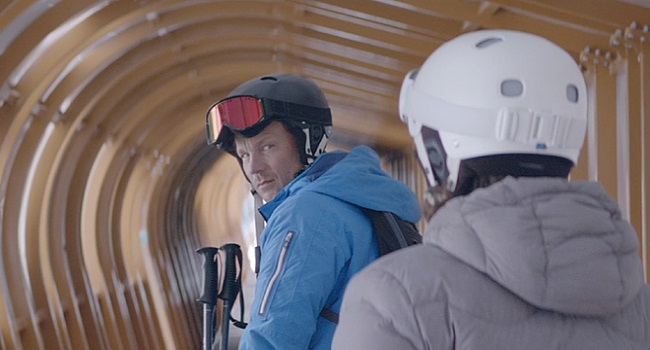This week TIFF will be hosting In Case of No Emergency: The Films of Ruben Östlund, a travelling retrospective on the Force Majeure director’s canon of films. Playing from April 9 to 14 at TIFF Bell Lightbox, the series will be highlighting Östlund’s rich and diverse works of which includes two of his award-winning short films and his four features to date. This review was originally posted on October 30, 2014 .
Set within the lush backdrop of the French Alps, director Ruben Östlund’s Force Majeure is a fascinating study of a family relationship on the brink of collapse. On a much needed vacation, Ebba (Lisa Loven Kongsli), her workaholic husband Tomas (Johannes Kuhnke) and their kids (Clara Wettergren and Vincent Wettergren) have dedicated five days of leisure at a ski resort. Their trip takes a drastic turn on the second day when, while having lunch on an outdoor terrace, an avalanche commences on the nearby mountain.
Gathering speed, the avalanche sets off a shockwave of panic for everyone on the balcony. Fearing for his life, Tomas flees saving his smart phone and ski gloves, but inadvertently leaves Ebba behind to protect their kids. Tomas’ action in a time of crisis ends up having a severe impact on the rest of the family and those around him. Viewed as a coward by many, Tomas must not only confront societal issues of masculinity, but also spend the rest of his vacation addressing the deep seeded family issues that his hasty retreat has stirred up.
Östlund does a great job of creating a rich drama from one simple moment of weakness. The entire family is rattled to the core by the incident. The children do not want anything to do with either of their parents and opt not to speak at all. Ebba does not know how to react to her kids’ anger or Tomas’ cowardice. It also does not help that Tomas is unable to process the true consequences of his action. He is in such denial that he even tries to turn the narrative around in his favor when discussing the events with a friend.
One of the things that make Force Majeure such a strong film is the way Östlund puts the audience right at the centre of the debate. He forces the viewer to contemplate how they would react under the same circumstances? Östlund makes several smart decisions behind the camera including shooting many of the key emotional scenes just outside the family’s hotel room. He juxtaposes theses tense scenes of conflict with serene images of the various family members doing mundane end of day tasks.
Cinematographer Fredrik Wenzel does memorable work evoking the look and feel of a mountain resort. The creaky sounds of the chair lifts and their bumpy accent to the top of the mountain are captured to perfection. The graininess of the snow, and the lack of visibility on the mountain at certain points, nicely mirrors the dense situation Tomas finds himself in. Johannes Kuhnke hits many different peaks and valleys needed for the role of Tomas. He adequately conveys a man who has sunk to the bottom rung on the family totem pole. Lisa Loven Kongsli is the straight line that cuts through her shallow husband. She is even keeled, and not one to dwell on the past, but refuses to let Tomas go on without owning up to his actions.
Force Majeure is an excellent psychological drama that flips a family tree upside down. It’s a production that forces the audience to not only contemplate Tomas and Ebba’s situation, but will surely lead to several heated discussions between couples after the screening. Force Majeure is a film that I can highly recommend.
Screens
Tuesday, April 14, 6:30 PM, TIFF Bell Lightbox
3 Comments
Comments are closed.



Sometimes, it was very dramatic. And others, it was actually kind of dramatic. But always, it was compelling. Nice review.
We LOVED this one, talked about it for hours, and really, for days. Was so disappointed it didn’t get nominated for an Oscar because it was honestly one of my favourites of the year.
I loved this movie!! great review..